- Home
- Martin Cruz Smith
Three Stations: An Arkady Renko Novel Page 3
Three Stations: An Arkady Renko Novel Read online
Page 3
“They were in my basket. I had two baskets, one for the baby and one for her things. She has a special blue blanket with yellow ducklings. All gone.”
“A birth certificate?”
“Gone. I know the color of her eyes and her hair and birthmark. Things only a mother would know.”
“Do you have any papers at all for you or the baby?”
“Stolen.”
“Can your parents supply this information?”
“They’re dead.”
“So on paper this baby does not exist and on the train it was invisible. Is that what you’re saying?”
The girl was silent.
“At what station did you board? Come now. You must know at what station you got on the train.”
“Or when she disappeared.”
“I told you. She was stolen while I was asleep. She was in a basket.”
“And you blame this so-called Auntie Lena?”
“Have you heard of her? She said everyone knew her.”
“No, I have never heard of such a person. Did you talk to anyone besides Auntie Lena?”
“No.”
“Did anyone else see the baby?”
“No.”
“Were you hiding the baby?”
The girl said nothing, although she felt the questions accelerate.
“What about the soldier?” the major asked.
“Sorry?”
“In your first version there was a soldier. You said you took your baby to the end of the car.”
“For fresh air.”
“For fresh air and out of view of the rest of the passengers?”
“Yes.”
“And very private.”
“I guess.”
“And there you were joined by the soldier.”
“Yes.”
“You and the soldier and the invisible baby.”
“Yes.”
The girl saw where they were headed. It was like suddenly finding herself being dragged down a snake hole. She spaced out, and when she tuned back in, the major was speaking with an air of conclusion. “…a false alarm. Taking her age into account, her fantasy might not have malicious intent, but a dangerous fantasy it is because the terrorist threat is real. A full-bore hunt would have demanded scores of militia chasing the chimera of a stolen baby. There is no stolen baby because there was no baby to steal. No further action will be taken by the Search Department, except to remand for observation the juvenile who identifies herself only as Maya.” The major turned off the recorder and added, “Sorry, dear. I never believed it from the start. No one would.”
“Just tell me,” the lieutenant said. “When you and the soldier went to the end of the car, did you give him a hand job or a blow job?”
Zhenya couldn’t see what happened in the interview room. He heard shouts and the sound of water mixed with breaking glass. The door flew open as the lieutenant, soaked through, rushed the girl through the corridor, past the velvet rope and piano and down the escalator, holding her by the collar of her jacket so that her feet barely touched the floor. One moment he was lifting her into the air and the next she slipped clean out of her jacket and bolted through the waiting room.
The lieutenant pursued her, his knees pumping, suddenly a track star. In the lingering twilight the pavement was still active despite the hour. The lieutenant was nearly within reach when she darted behind a stack of parcels, between pensioners in wheelchairs, under a table of souvenirs and finally through an extended family of Chechens. Some devious shit, Zhenya thought. People cheered and applauded the girl’s wild dash. Zhenya watched in awe.
“Cunt!” The officer pulled up lame and threw the girl’s jacket. He limped in a circle to catch his breath, and by the time the cramp in his leg began to ease, the girl had disappeared. He didn’t even know in which direction. Would it have been so hard for a citizen to stick out a foot and trip the little bitch? The arrogant shits of Moscow had, as usual, given the militia no help at all. For example, he went to collect the girl’s jacket and it was gone.
It wasn’t difficult for Zhenya to find the girl. Her red hair was hard to hide, and although she had found the underground connection to the Metro, he didn’t think she was going far. He went through the contents of her jacket: reading glasses, a butane lighter, half a pack of “Russian Style” cigarettes and an envelope containing 1,500 rubles, the rough equivalent of sixty dollars, which Zhenya suspected was all the money she had in the world. No cell phone and no ID. Internal passports were issued at sixteen years. She was no older than he was.
The Metro was a grandiose Stalin-era hole in the ground a hundred meters deep, an air-raid shelter with ballroom chandeliers and escalators that clacked like wooden teeth. The girl was ten steps below him.
How crazy was she? The lieutenant aside, wouldn’t a real mother have supplied all the information the major demanded? There would have been a proper search with bulletins, television appeals, adequate manpower and search dogs. Probably she was mentally unbalanced and “Baby” would turn out to be a lost pet.
Riders divided onto the platform or to the escalator to another, deeper subway line. Alone, the girl went to the far end of the platform and slipped down behind an octagonal column of limestone. Zhenya followed at a distance in a self-appointed, vaguely protective way. Over the train tunnel a digital clock began counting down from five minutes until the next train.
A mural in gilded tiles celebrated Soviet labor, and on the ceiling—for those with rubber necks—spread a gallery of patriots. The rush of air through tunnels seen and unseen and around the columns sounded like a respiratory system beneath the earth.
She was peeved as he came around the last column, as if her concentration had been broken. Or a private moment violated. To himself he said, “This is fucked.”
Sitting cross-legged, the girl pressed a razor against her wrist but not hard enough yet to pop the vein. Double-edged. She might have outraced the lieutenant minutes before. Now she looked catatonic. As she raised her eyes he understood that at any moment he could be standing in blood.
“Do you have my baby?”
“I can help,” Zhenya said. He drew her leather jacket out of his backpack and showed her that the money and other contents were still in the jacket pockets, but she wouldn’t take her eyes off his.
“You don’t have my baby?”
“But I can help you. No one knows Three Stations better than me. I’m here all the time. Every day.” He talked fast with his eye on the blade. “I’m just saying if you want, you know, I can help.”
“You’ll help me?”
“I think so.”
“In exchange for what?”
“What do you mean?”
She let a pause build. “You know what I mean.”
“No.” Zhenya’s face went red.
“It doesn’t matter.” Keeping the razor poised became tiresome and she let her arms relax. “Where are we?”
“The Metro under Three Stations. You’ve never been here before?”
“No. Why aren’t you in school?”
“Bobby Fischer used to say school was a waste of time, that he never learned anything in school.”
“Who is Bobby Fischer?”
“The greatest chess player in history.”
She gave him a blank look. Zhenya had no experience with girls. They treated him as if he were invisible and he returned the favor. He didn’t modulate his voice in public and he was a disaster at conversation, yet he thought he must have said something right, because she slid the razor into a cardboard sleeve and got to her feet. With the tinkling of chandeliers and a buffeting of air, a train entered the station along the near side of the platform. If she had asked, he could have told her to avoid cars marked with a red stripe because of cracks in the undercarriage. He knew all sorts of stuff.
She asked, “How old are you?”
“Sixteen.” He added a year.
“Sure.”
“My name is Zhenya Lysenko.”
“Zhenya Lysenko, Zhenya Lysenko.” She found the name uninspiring.
“What’s yours?”
“Maya.”
“Just Maya?”
“Maya.”
“I saw you outrun the lieutenant. That’s typical. You go to them for help and almost get arrested.”
“I don’t need them.”
“Do you have family in Moscow?”
“No.”
“Friends?”
“No.”
A train arrived on the other side of the platform and the din of passengers made speech impossible. By the time the train closed its doors and drew away from the platform, Zhenya had added it up. All she had was him.
Zhenya and Maya pushed through the amorphous mass that was a Russian queue, past biznesmen whose business fit into a suitcase, Uzbek women swathed in color, babushkas draped in gray, soldiers on leave sucking their last beer dry. Most of the trains were elektrichkas, locals with overhead cables, but some were destined to cross mountains and deserts to exotic locales thousands of kilometers away. An express left Platform 3. Halfway across the station yard the train met heat waves, entered a lagoon of semaphores and signals, sank and disappeared. The Platform 3 conductor, an energetic woman in a blue uniform and running shoes, fanned herself with her signal paddle and thought that if the two teenagers coming her way had missed their train there was nothing she could do about it now.
Zhenya and Maya had switched. She wore his sweatshirt open but with the hood up to conceal her red hair and he, in turn, had pulled on her leather jacket, even though the sleeves rode high on his skinny forearms. Out the corner of his eye he admired the way Maya boldly marched up to the conductor.
“You’re not the conductor who was here this morning.”
“Of course not. Her shift is over.”
“And this morning’s trains?”
“Back in service. Why? Did you lose something?”
“Yes.”
The conductor was sympathetic. “I’m sorry, dear. Anything you leave on a train is probably gone for good. I hope it had no sentimental value.”
“I lost my baby.”
The conductor looked from Maya to Zhenya and back.
“Are you serious? Have you been to the Search Department?”
“Yes. They don’t believe me.”
The conductor lost her breath all at once. “Good Lord, why not?”
“They want to know too much. I just want my baby. A girl three weeks old.”
“Is this true?” the conductor asked Zhenya.
“She thinks it was stolen by someone called Auntie Lena.”
“I never heard of her. What is your name, dear?”
“Maya.”
“Are you married, Maya?”
“No.”
“I understand. Who is the father?” The conductor gave Zhenya a significant glance.
Maya said, “Not a chance. I just met him.”
The conductor thought for a moment before asking Zhenya, “Have you seen the baby?”
“No.”
“Then I’m so sorry. It’s a criminal matter if a baby has been abducted. The Search Department is the proper authority. I wish I could help.”
“She has a faint birthmark on the back of her neck. Almost like a question mark. You have to lift her hair to see it.”
Zhenya thrust a piece of paper into the conductor’s hand. “This is my cell-phone number. Please call if you hear anything.”
A man with a suitcase in one hand and a toddler in the other arrived at the platform to find that their train was gone. As the man slowed to a standstill the toddler slipped to the ground and cried.
Tears escaped from Maya’s eyes. Worse, to her fury, was how her breasts ached.
Zhenya steered her off the platform. Now that the crying had begun, she couldn’t stop, as if at that moment her baby were being wrested from her hands. Not sobbing but bent over and racked. Zhenya prided himself on his lack of emotion and it was frightening how her crying knotted his throat.
He said, “This is fucked, this is really fucked.”
“My baby.”
“I know an investigator in the prosecutor’s office. He’s a decent guy.”
“No prosecutors, no police.”
“Just talk to him. Whoever took the baby could have gone a hundred different ways. Two people can’t cover them all.”
“No police.”
“He’ll help privately.”
The suggestion mystified her. “Why would he do that?”
“He’s got nothing else to do.”
4
By Kazansky Station was a two-story building with a militia sign so discreet it might have been a public toilet. Over the years Arkady had visited a dozen times to take a suspect for interrogation or to save a suspect from interrogation and the risers of the stairs were appropriately faced with cracked tiles that looked like broken teeth. He climbed the steps to a squad room with the residue of pizza boxes, grease boards, dusty photos of forgotten heroes, old bulletins curled into yellow scrolls, new bulletins in the wastebasket and desks marked by cigarette burns and coffee stains, much the way Arkady felt.
In a corner office Colonel Malenkov, sunburned and slathered with cream, was hanging a certificate on the wall. Every movement looked painful. His bald spot looked painful.
“Enough of fucking Crete and its fucking sun. It was full of Russians anyway.”
The certificate stated that Colonel Leonid N. Malenkov had attended a “Tenth Annual International Conference on Counterterrorism.” Similar certificates from Tunis, Amsterdam and Rome were already hung.
Arkady said, “They’re tilted.”
“They shift. It’s the vibration from the trains. Sometimes the whole building shakes.”
Arkady read the motto that appeared in English on each certificate: “Vigilance Keeps Us Free. What does that mean?”
“Terrorists cooperate on a global level. We must do the same.”
“Good. You can cooperate with me.”
“You’ve got some brass.”
“The dead girl in the trailer. She was in your precinct. Why didn’t you respond to the dispatcher?”
Malenkov moved stiffly to his desk and settled gently on his chair. “Renko, you tried to have me up for running a prostitution ring. Fortunately the prosecutor didn’t think you had a case. Justice was served and you went home to chew on your dick. Why would I talk to you?”
“You have no one else to talk to. This place is empty.”
“That’s right. They’re all out on cases. Real cases.”
“Do you mind if I smoke?”
“I wouldn’t mind if you blow it out your ass. I can’t believe you have the balls to walk in here.”
“How would you like to do it again?”
“Do what?”
“Go through another investigation.”
“You’d lose again.”
“But it was expensive, wasn’t it? As I remember, you had lawyers.”
“Fucking leeches.” Usually Malenkov employed physical threats; the sunburn had obviously affected him. “I heard you were in some kind of deep freeze.”
“Yet here I am.”
“What are you after? You’re always after something.”
“A little conversation.”
“Well, you’re a little ahead of yourself. An investigator only takes over when the detectives are done.”
“It’s not my case. I happened to be riding with Lieutenant Orlov when the call came in.”
“The last time I saw Victor Orlov he couldn’t piss straight enough to hit a barn.”
“His aim has improved.”
“Good. Then he ought to be able to handle a simple overdose.”
“We’re not certain that it was simple.”
“One dead skank is pretty much like another.”
Arkady handed his cell phone to Malenkov. Olga filled the screen. Death gave her a quiet that only made her youth more poignant. Arkady let the c
olonel’s eyes have their fill.
Malenkov shrugged. “Okay, she was a pretty girl. Moscow is full of pretty girls.”
“She wasn’t in your string?”
“I don’t know what you’re talking about. A precinct commander doesn’t have much contact with the general public unless they’re murdered or torched.”
“Torched? That happens often?”
“You know kids. Do you have any witnesses?”
“Sergeant Orlov is canvassing the area.”
“From the freak show here? People here see cockroaches as big as dogs.”
“She was found in a workers’ trailer twenty-five meters from where we are right now. Extension cords run from the back of this station house to the trailer. It’s your trailer.”
Malenkov slid Arkady’s cell phone back across the desk. “It’s an abandoned trailer. Let me ask you, was this girl raped? Beaten? Did you see any ‘unusual circumstances’?”
“Her underpants were taken and she was left on display. That sounds ‘unusual’ to me.”
“Really? How unusual is it for a prostitute to remove her panties? As I remember, that’s what they’re paid to do. You say she was ‘on display’? Some clients only want to watch. Girls arrive from the countryside every day to let them fuck, watch or whatever. We have a flood of them. They shoot up and overdose because they’re not the brightest individuals in the world. So we don’t waste time on ODs.”
“You bury them as quickly as you can.”
“Life is unfair. Why should death be any different?”
An audible shimmy ran through the building as two hundred tons of diesel locomotive approached on a near track. The certificate from Crete shifted, Rome trembled, Tunis leaned and Amsterdam followed suit. While Malenkov was occupied with adjusting them Arkady scooped his cell phone into an envelope, taking care not to smear the colonel’s fingerprints.
5
Zhenya didn’t understand why Maya refused to go to the militia; this was one of those rare occasions when the police might do some good. There should be a manhunt and pictures of the baby shown on the news. How else to cover three major railway stations and their Metro connections? Instead, she insisted on begging for information from platform conductors, cleaning ladies and café staff while she refused to divulge her own name or where she came from. The more questions she asked the more suspicion she aroused.

 Polar Star
Polar Star Red Square
Red Square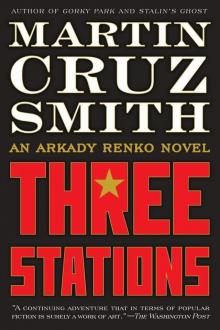 Three Stations
Three Stations Wolves Eat Dogs
Wolves Eat Dogs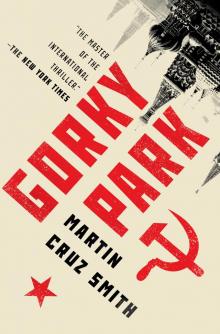 Gorky Park
Gorky Park December 6
December 6 Havana Bay
Havana Bay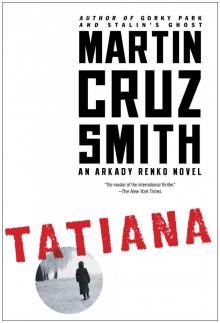 Tatiana
Tatiana The Girl From Venice
The Girl From Venice Stalin's Ghost
Stalin's Ghost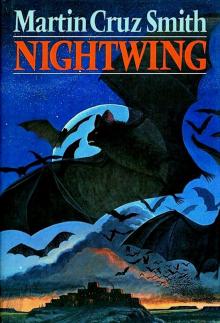 Nightwing
Nightwing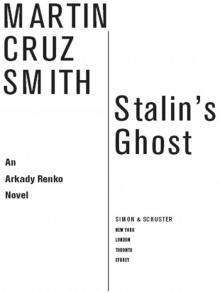 Stalin s Ghost
Stalin s Ghost Gypsy in Amber
Gypsy in Amber Rose
Rose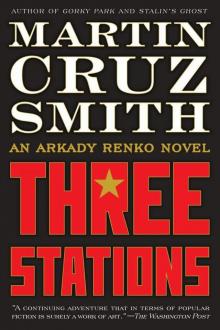 Three Stations: An Arkady Renko Novel
Three Stations: An Arkady Renko Novel The Siberian Dilemma
The Siberian Dilemma December 6 (V5.0)
December 6 (V5.0)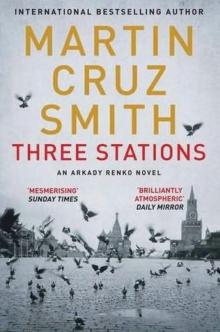 Three Stations ar-7
Three Stations ar-7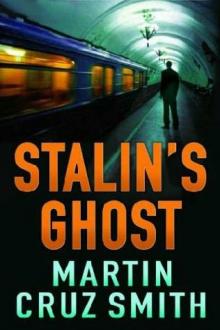 Stalin’s Ghost ar-6
Stalin’s Ghost ar-6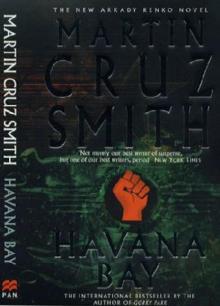 Havana Bay ar-4
Havana Bay ar-4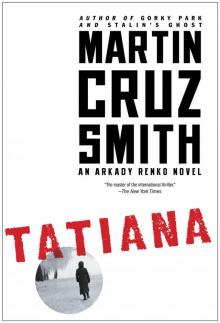 Tatiana ar-8
Tatiana ar-8